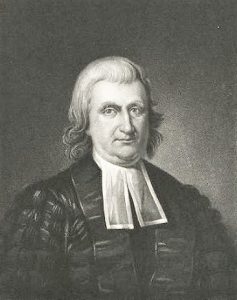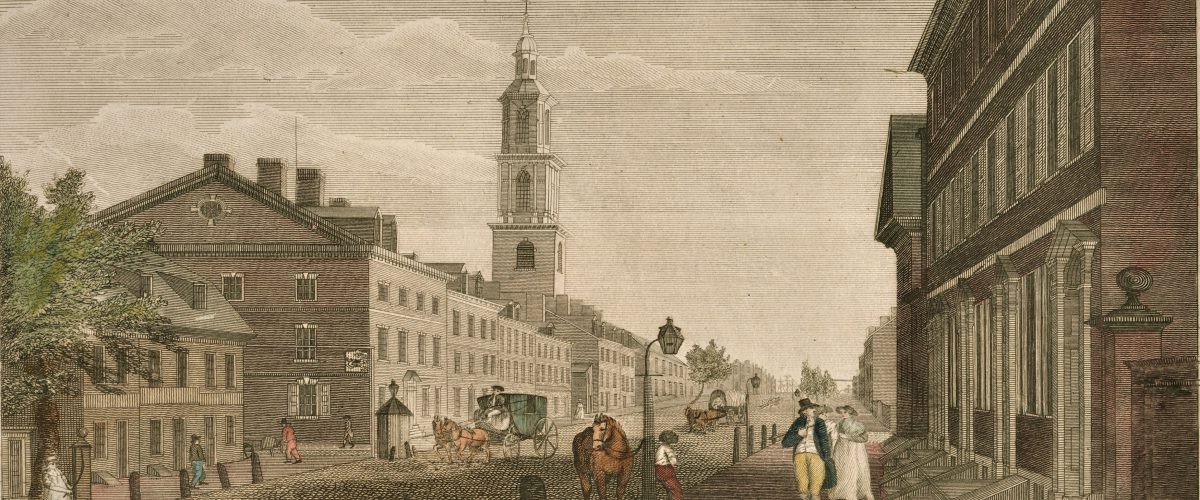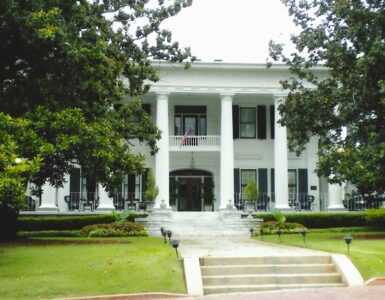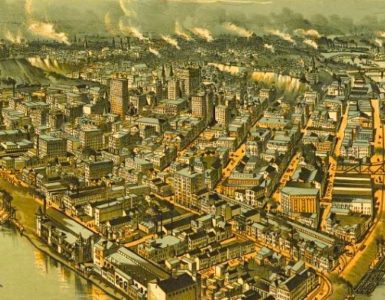 Four-hundred years after the Pilgrims celebrated God’s preservation of their lives through a difficult winter and his gracious gift of an abundant harvest in the spring of 1621, the United States will have its annual holiday of Thanksgiving on November 25, 2021. As this holiday is remembered, it is timely to recount the founding of the nation and its relationship to American Presbyterians and the Christian influences on the nation as seen in the body politic known as the Pilgrims of Plymouth. A key factor common to both the nation and the Presbyterian Church is that each is governed by a constitution. According to Noah Webster’s American Dictionary of the English Language, 1828, a constitution is—
Four-hundred years after the Pilgrims celebrated God’s preservation of their lives through a difficult winter and his gracious gift of an abundant harvest in the spring of 1621, the United States will have its annual holiday of Thanksgiving on November 25, 2021. As this holiday is remembered, it is timely to recount the founding of the nation and its relationship to American Presbyterians and the Christian influences on the nation as seen in the body politic known as the Pilgrims of Plymouth. A key factor common to both the nation and the Presbyterian Church is that each is governed by a constitution. According to Noah Webster’s American Dictionary of the English Language, 1828, a constitution is—
The established form of government in a state, kingdom or country; a system of fundamental rules, principles and ordinances for the government of a state or nation. In free states, the constitution is paramount to the statutes or laws enacted by the legislature, limiting and controlling its power; and in the United States, the legislature is created, and its powers designated, by the constitution.
Webster expressed the definition well as he described the political aspects of the term emphasizing that a constitution defines and limits what legislators can do. But then he goes on to give alternate definitions—
A particular law, ordinance, or regulation, made by the authority of any superior, civil or ecclesiastical; as the constitutions of the churches; the novel constitutions of Justinian and his successors. [then the next alternate] A system of fundamental principles for the government of rational and social beings.
A constitution is the source of authority for the government of rational and social beings whether in a political, ecclesiastical, or any other body of individuals desiring government limited by a definitive and final authority. There are republican similarities between the political body that is the United States government and the ecclesiastical body that is the Presbyterian Church. Elders rule within the sessions of ecclesiastical parishes and gather for meetings in presbyteries within synods that constitute the general assembly which then deliberate issues of common church interest; senators and representatives gather in their respective chambers for legislative purposes while representing their political parishes.
In 1789, the United States and the Presbyterian Church experienced important events relative to their constitutions. Ratification of The Constitution of the United States had been completed the previous year when nine of the thirteen states voted in favor of the document with the ninth state, New Hampshire, casting the deciding vote June 21, 1788. Per the Constitution, George Washington was elected president and took the first oath of office April 30, 1789 (postponed from the stipulated date due to bad weather) while standing on the balcony of Federal Hall in New York before a great crowd. Washington was concerned that the populace might view him as king and he took seriously the constitutional limitations on his power while realizing as the first holder of the first office that his actions would set precedents. His popularity is clearly visible in his receiving all sixty-nine votes of the Electoral College. The national constitution defined and restrained power through a republican representation of the people in Congress and a system of checks and balances on the power of the three branches—executive, legislative, and judicial. Three weeks after General Washington was inaugurated president, the First General Assembly of the Presbyterian Church in the United States of America was convened by John Witherspoon in Second Church, Philadelphia. The assembly elected John Rodgers moderator to replace aging and ailing Convener Witherspoon at the podium. The Constitution of the Presbyterian Church in the United States of America stipulates Scripture is the primary standard of the denomination with its confessional standard the Westminster Confession of Faith and associated catechisms, to which are added the tertiary documents of the Form of Government and Discipline and the Directory for the Worship of God. This constitution had been ratified (the word used in the minutes) May 28, 1788 with its publication assigned to local printer of note, Thomas Bradford, who made the books available in 1789 after some troubles getting it to press. In the introduction to the Form of Government it is stated that the source of all authority is Scripture, and the purpose of Presbyterian constitutional law is to restrain those who shepherd and serve the church as ministers, ruling elders, and deacons. The following is from the introduction to the Form of Government—
That all Church power, whether exercised by the body in general, or, in the way of representation, by delegated authority, is only ministerial and declarative: That is to say, that the Holy Scriptures are the only rule of faith and manners; that no Church judicatory ought to pretend to make laws, to bind the conscience, in virtue of their own authority; and that all their decisions should be founded upon the revealed will of God: Now though it will easily be admitted, that all Synods and Councils may err, through the frailty inseparable from humanity; yet there is much greater danger, from the usurped claim of making laws, than from the right of judging upon laws already made, and common to all who profess the Gospel; although this right, as necessity requires in the present state, be lodged with fallible men. (page cxxxv)
Both the United States and the Presbyterian Church constitutions establish the importance of law to limit their actions, with the Presbyterians having the added direction of not making laws that bind the conscience through requiring what is not clearly taught in Scripture. An interesting similarity of the U.S. Constitution with the Presbyterian one is the national one was composed when revision of the Articles of Confederation was abandoned, and the Westminster Confession of Faith was composed when revision of the Thirty-Nine Articles of the Church of England was abandoned. Does this show that intentions to revise inevitably lead to re-composition?—something to keep in mind when considering revision of constitutions whether they be church or state.
 The Presbyterian Church was an important influence in the era as the years of the eighteenth century drew to an end. In the seventeen eighties the number of Presbyterian churches was second only to those of the Congregationalists. The two denominations are named for their presbyterian and congregational systems of church government, but they had a common confessional bond in the theology of the Westminster Confession (at least in theory). Presbyterian and Congregational churches combined constituted over forty percent of the nation’s churches. If there had been a state church, it may have had the Westminster Confession for its standard of essential Scriptural doctrine.
The Presbyterian Church was an important influence in the era as the years of the eighteenth century drew to an end. In the seventeen eighties the number of Presbyterian churches was second only to those of the Congregationalists. The two denominations are named for their presbyterian and congregational systems of church government, but they had a common confessional bond in the theology of the Westminster Confession (at least in theory). Presbyterian and Congregational churches combined constituted over forty percent of the nation’s churches. If there had been a state church, it may have had the Westminster Confession for its standard of essential Scriptural doctrine.
As Moderator Rodgers followed the docket and appointed committees, he addressed the recent inauguration of President Washington. He appointed Witherspoon, Patrick Alison of the Presbytery of Baltimore, and Samuel Stanhope Smith a committee to draft a letter from the General Assembly to President Washington. The letter was adopted unanimously by the presbyters and sent to him.
The letters that follow are not only the Presbyterian one to George Washington but also his answer. They are copied here as found in W. E. Moore’s The Presbyterian Digest of 1886. A Compend of the Acts, and Deliverances of the General Assembly of the Presbyterian Church in the United States of America, pages 287-89. Moore transcribed them from the published minutes as cited in brackets; note that later editions of Moore have only references referring back to his 1886 edition for the full text. Both letters are well written and they show how much our text-twitter world has eroded the English language and American literacy. I think the edge for beauty is the Presbyterian letter, which begs the question, who was the primary penman of the three (someone on a committee is often given the task of writing the first draft based on thoughts expressed by the members).
TO THE PRESIDENT OF THE UNITED STATES:
Sir: The General Assembly of the Presbyterian Church in the United States of America embrace the earliest opportunity in their power to testify the lively and unfeigned pleasure which they, with the rest of their fellow citizens, feel on your appointment to the first office in the nation.
We adore almighty God, the Author of every perfect gift, who hath endued you with such a rare and happy assemblage of talents as hath rendered you equally necessary to your country in war and in peace. Your military achievements ensured safety and glory to America in the late arduous conflict for freedom, while your disinterested conduct and uniformly just discernment of the public interest gained you the entire confidence of the people; and in the present interesting period of public affairs the influence of your personal character moderates the divisions of political parties, and promises a permanent establishment of the civil government.
From a retirement more glorious than thrones and scepters you have been called to your present elevated station by the voice of a great and a free people, and with an unanimity of suffrage that has few if any examples in history. A man more ambitious of fame or less devoted to his country would have refused an office in which his honors could not be augmented, and where they might possibly be subject to a reverse. We are happy that God has inclined your heart to give yourself once more to the public. And we derive a favorable presage of the event from the zeal of all classes of the people and their confidence in your virtues, as well as from the knowledge and dignity with which the federal councils are filled. But we derive a presage even more flattering from the piety of your character. Public virtue is the most certain means of public felicity, and religion is the surest basis of virtue. We, therefore, esteem it a peculiar happiness to behold in our Chief Magistrate a steady, uniform, avowed friend of the Christian religion, who has commenced his administration in rational and exalted sentiments of piety, and who in his private conduct adorns the doctrines of the gospel of Christ, and on the most public and solemn occasions devoutly acknowledges the government of divine Providence.
The example of distinguished characters will ever possess a powerful and extensive influence on the public mind; and when we see in such a conspicuous station the amiable example of piety to God, of benevolence to men and a pure and virtuous patriotism, we naturally hope that it will diffuse its influence, and that eventually the most happy consequences will result from it. To the force of imitation we will endeavor to add the wholesome instructions of religion. We shall consider ourselves as doing an acceptable service to God in our profession when we contribute to render men sober, honest and industrious citizens, and the obedient subjects of a lawful government. In these pious labors we hope to imitate the most worthy of our brethren of other Christian denominations, and to be imitated by them, assured that if we can by mutual and generous emulation promote truth and virtue, we shall render a great and important service to the republic, shall receive encouragement from every wise and good citizen, and above all meet the approbation of our divine Master.
We pray almighty God to have you always in his holy keeping. May he prolong your valuable life, an ornament and a blessing to your country, and at last bestow on you the glorious reward of a faithful servant.
Signed by order of the General Assembly. John Rodgers, Moderator. Philadelphia, May, 1789.
[Minutes, 1789, p. 11.]
George Washington Replied as follows:
To the General Assembly of the Presbyterian Church in the United States of America.
Gentlemen: I receive with great sensibility the testimonial given by the General Assembly of the Presbyterian Church in the United States of America of the lively and unfeigned pleasure experienced by them on my appointment to the first office in the nation.
Although it will be my endeavor to avoid being elated by the too favorable opinion which your kindness for me may have induced you to express of the importance of my former conduct and the effect of my future services, yet, conscious of the disinterestedness of my motives, it is not necessary for me to conceal the satisfaction I have felt upon finding that my compliance with the call of my country and my dependence on the assistance of Heaven to support me in my arduous undertakings have, so far as I can learn, met the universal approbation of my countrymen. While I reiterate the professions of my dependence upon Heaven as the source of all public and private blessings, I will observe that the general prevalence of piety, philanthropy, honesty, industry and economy seems, in the ordinary course of human affairs, particularly necessary for advancing and confirming the happiness of our country. While all men within our territories are protected in worshiping the Deity according to the dictates of their consciences, it is rationally to be expected from them in return, that they will all be emulous of evincing the sincerity of their professions by the innocence of their lives and the benevolence of their actions; for no man who is profligate in his morals, or a bad member of the civil community, can possibly be a true Christian or a credit to his own religious society.
I desire you to accept my acknowledgments for your laudable endeavors to render men sober, honest and good citizens, and the obedient subjects of a lawful government, as well as for your prayers to almighty God for his blessing on our common country and the humble instrument which he has been pleased to make use of in the administration of its government.
George Washington.
[Minutes, 1790, p. 24.]
In a way the letters do not say much. Each writer says to the recipient what would be expected. Washington was praised for his service, great character, high integrity, piety, and willingness to come out of retirement, while the Assembly expressed its hope that his would be a great presidency. Washington praised the Presbyterians for their commitment to piety and exemplification of Christianity, and he acknowledged his need for the “assistance of Heaven to support me in my arduous undertakings.” Washington mentioned how important it was to him for the people to have freedom to worship “the Deity according to the dictates of their consciences.” Even though the letters are polite communications with minimal content, they are important because they show the different duties the church and state exercise; the Presbyterians looked to Washington as a military and political leader while he looked to the Presbyterians to continue encouraging congregants to achieve exemplary piety. These letters may be the first correspondence between a President of the United States and a denomination, but given Washington’s ecclesiastical commitment was Episcopal, probably not. It may be easier for a bishop to be timely writing a letter than for a body of presbyters constrained by an annual general assembly.
The general unrest in the United States reported in the evening news and in print is indicative of many hearts that, as Augustine expressed it, have not found their rest in Thee. The complications, deaths, and drain on patience wrought by Covid are disturbing, and it seems that no matter what the issue may be, everyone is mad about something. The world needs to turn to the One who brings rain to fall on the just and the unjust (Matthew 5:45); the One upon whose earth everyone walks and lives as He graciously allows use of His cattle upon a thousand hills (Psalm 50:10); the One in whom all live and move and have their being (Acts 17:28); but most of all, the One who sent His only begotten Son to be tempted, live perfectly, and die on the cross for His people (1 Peter 2:24; Hebrews 9:12). Four-hundred years after those brave and bold Pilgrims thanked God for his care as they built Plymouth guided by their constitution called the Mayflower Compact, this Thanksgiving Christians should celebrate God’s goodness and trust him to continue caring for them. One final thought is constitutions are only as good as the people who submit to and apply them. If a nation or a denomination does not take its constitution seriously as the source document governing all other law, then it becomes merely a historical document of quaint and passing interest.
The author’s articles, “Pilgrims and Plymouth: 400 Years Later,” posted October 19, 2020, and “Thanksgiving: 400 Years Later,” posted November 18, 2021, have been made available through the courtesy of the editors of Place For Truth. Both of these articles are more specifically concerned with the Pilgrims and Thanksgiving and it is suggested you read the 2020 article before the 2021. Both the reformation21 articles were written from two motives–first, the Pilgrims are not truthfully presented by many modern historians due to a presuppositional disposition against anything associated with the Puritans, and secondly, some of us who are Christians expect too much in life and are not always as grateful to the Lord as we should be. There is a bit of overlap between the articles, but not much.
Barry Waugh
Notes—The header image with Second Church, Philadelphia, at its center is, along with the picture of General Washington, from the Digital Collection of the New York Public Library; note the Washington portrait caption calls him General Washington, his preferred title. The Witherspoon portrait is from the www. The statistics in the first paragraph date to 1780 and are from Edwin S. Gaustad, Historical Atlas of Religion in America, 1962; the statistics are likely dated due to later studies and later editions by Gaustad, but the numbers still show the relative size of the Presbyterian Church. When the Lutheran and Reformed denominations are added to the statistical balance, the nation was decidedly confessional. The other churches in Gaustad’s table are in order of size, largest to smallest: Baptist (third), Anglican, Lutheran, German Reformed, Dutch Reformed, and Roman Catholic. Information about Washington’s inauguration is from “George Washington’s First Inaugural Address, April 30, 1789” on The Center for Legislative Archives website; images of his written inaugural speech are there as well. The National Constitution Center blog has a brief summary of the process with dates significant to the Constitution in the entry “The Day the Constitution was ratified;” June 21, 2021 by NCC Staff. Information about the first election of George Washington is available at “Presidential Election of 1789” on the website, George Washington’s Mount Vernon. The exact wording in the Constitution for its name is, “do ordain and establish this Constitution for the United States of America,” which shows even more the parallel with The Constitution of the Presbyterian Church in the United States of America.





